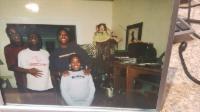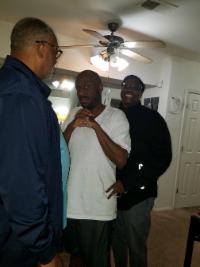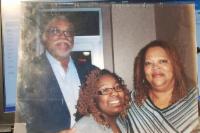Tell me about being a father?
If there is anything better than being a father, I don’t know what it is. It is the ultimate gift!
Share about your child with a disability?
I have an adult son, Quinten, who is a person with autism spectrum disorder (ASD). He’s very bright. He is like a puzzle- he’s a problem solver. He has always been inquisitive and intelligent and was very successful in school. When he was just a toddler, he had these big eyes that looked like he had been scared, so I called him Boo, and that name has just stuck with him; that’s his nickname Boo!
Please give us some of the joys and challenges of raising him.
We could not tell at birth, but around 13 months, we suspected something might be different with Quinten. We didn’t know what to do, so we started by doing the drum thing – putting the drum in the middle of the floor to see if he would respond. We initially thought he had a hearing impairment, but we took him to get evaluated – evaluation is critical and important. Only after that evaluation was he identified as a person on the spectrum with autism. It was a hard day for my wife and me. I remember she cried all day, but I want to say it’s not the end of the world. Back then, the numbers were different. It was 1 in1600 with a diagnosis of autism spectrum disorder. Now it’s more prevalent (The latest CDC data states 1 in 59 children are diagnosed with ASD). One of the things we had to do was to fight for rights; the city didn’t have supports for him. Much has changed over the years; to get services back then, he had to have a dual diagnosis of MR (now known as an intellectual disability) and autism. That was the only way he was able to get services. My wife, Quintina, a Quality Trust Board member, is a fierce advocate for our son and all our children. We realized that all the services we were seeking for him were outside the city, and we wanted to help change that. Quintin was about 9 or 10 years old before engaging with others within the community. There’s a period from diagnosis to dealing with the public, and we grappled with it for almost ten years. Everyone goes through it.
What would you say to a parent who is going through that transition?
Two things happen 1) you worry a lot about your child, and 2) you’re worried about what people think. We learned to take him everywhere and told our family we were bringing him. You must get over if they make noises or do things others think of as strange. However, when you are out, pay close attention to your child. You need to allow them to explore; like all children, they are very inquisitive by nature. You must allow them to be that way, don’t restrict them. I’ve had the opportunity to speak to parents about this, and I can recall a story of a grandmother who was the caregiver for her grandson. She drove him to school instead of allowing him to ride the bus. What I have found is that the anxiety is ours as caregivers. The anxiety and fear are not your child’s – it’s yours! Don’t restrict them. I encouraged her to allow him to ride the bus. We need to enable our children to experience the world.
I’ve learned a lot from Quinten. As I said, he’s very smart. Fatherhood is fantastic. My mother taught my siblings and me to be sensitive; we learned early. My style is to be educational and intentional about behaviors with my son, and we have a special relationship. He’s comfortable with me, and I love him so much.
I’d like to know more about your advocacy work
From 1970 to 1994, I was a police officer where I lived, working in it to do my part to improve the community. As a member of the Black Police Association, my activism started early when they began to close Forest Haven and Saint Elizabeths Hospital. They both were on my foot beat. The police department recruited officers to go in and work within the facility for a few weeks to learn more about people with disabilities. I also served on the DC Police Reform Commission. We had conversations about law enforcement and people with disabilities. The DC Developmental Disabilities Council represented this collective of voices with the final Commission report. Their recommendation, along with others, was to use mental health professionals to respond to mental health episodes instead of police officers.
Recently Quinten moved to assisted living. It was very, very emotional for my wife and me. I learned from my mother that we take care of our family. She believed in a safety net, and my family believes in a safety net, and he was with us for more than 30 years. But as we age, we want to ensure that he is well cared for. He comes home on weekends; as a matter of fact, he’s coming home to celebrate the holiday with us. I’m really looking forward to that. Being a father, it’s the best job I’ve ever had!



